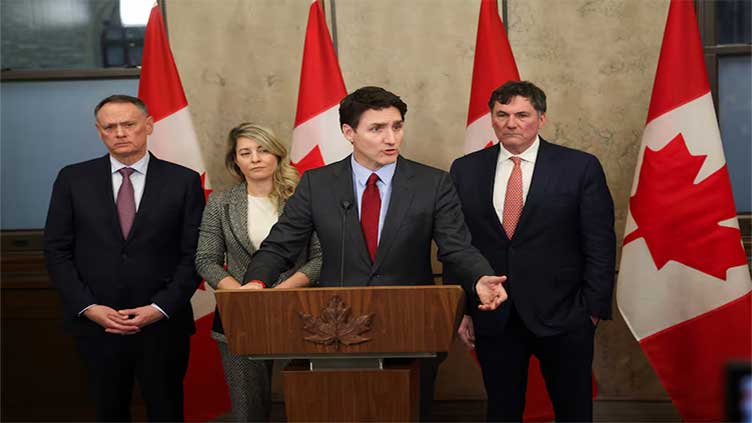Canada, Mexico announce retaliatory tariffs on US

Business
Trudeau told a news conference he was slapping tariffs on C$155 billion ($107 billion) of US goods
Trudeau said the coming weeks would be difficult for Canadians but that Americans would also suffer from Trump's actions
The 9,000-km US-Canada border handles over $2.5 billion in trade a day, according to Canadian government data from 2023
"I've instructed my economy minister to implement the plan B we've been working on," President Sheinbaum posted on X
OTTAWA (Reuters) – Canada will retaliate against President Donald Trump'snew tariffs with 25% levies on a raft of US imports, Prime Minister Justin Trudeau said on Saturday, warning Americans that Trump's actions would have real consequences for them.
As relations between the long-time allies who share the world's longest land border reach a new low, Trudeau told a news conference he was slapping tariffs on C$155 billion ($107 billion) of US goods. Those on C$30 billion will take effect on Tuesday, the same day as Trump's tariffs, and duties on the remaining C$125 billion in 21 days, he said.
Trudeau's announcement came just hours after Trump ordered 25% tariffs on Canadian and Mexican imports and 10% on goods from China, risking a trade war that economists say could slow global growth and reignite inflation.
Trump said he would impose 10% tariff on all energy imports from Canada.
The Canadian leader said tariffs would include American beer, wine and bourbon, as well as fruits and fruit juices, including orange juice from Trump's home state of Florida. Canada would also target goods including clothing, sports equipment and household appliances.
Trudeau said the coming weeks would be difficult for Canadians but that Americans would also suffer from Trump's actions.
"Tariffs against Canada will put your jobs at risk, potentially shutting down American auto assembly plants and other manufacturing facilities," Trudeau said, addressing US citizens during a press conference in Ottawa.
"They will raise costs for you, including food at the grocery store and gas at the pump."
Canada is considering non-tariff measures, potentially relating to critical minerals, energy procurement and other partnerships, Trudeau said.

The 9,000-km (5,600-mile) US-Canada border handles over $2.5 billion in trade a day, especially in energy and manufacturing, according to Canadian government data from 2023.
In 2023, Canada exported close to C$550 billion worth of goods and services to the US, or more than three-fourths of its total exports. Energy accounted for 30% and manufacturing contributed around 15% to exports south of the border.
Exports to the US accounts for roughly 17.8% of Canadian gross domestic product and more than 2.4 million jobs in Canada.
The tariffs hit Canada as it deals with a political crisis and a leadership race within Trudeau's Liberal Party.
Facing low approval ratings, Trudeau has said he will resign after nine years in office once a new party leader is chosen. The opposition Conservatives could win the next election by a thumping majority, according to recent opinion polls.
Flanked by his foreign affairs and finance ministers a somber Trudeau recalled the years of bilateral relations between the two countries.
"From the beaches of Normandy to the mountains of the Korean Peninsula, from the fields of Flanders to the streets of Kandahar, we have fought and died alongside you during your darkest hours," he said. "We've built the most successful economic, military and security partnership the world has ever seen."
Trudeau encouraged Canadians to buy Canadian products and vacation at home rather than in the US.
"We didn't ask for this but we will not back down," he said.
Mexico orders tit-for-tat tariffs

Mexican President Claudia Sheinbaum also ordered retaliatory tariffs in response to the US decision to slap 25% tariffs on all goods coming from Mexico, marking the apparent start of a trade war between the two countries.
In a lengthy post on X, Sheinbaum said her government sought dialogue rather than confrontation with its northern neighbour, but that Mexico had been forced to respond in kind.
"I've instructed my economy minister to implement the plan B we've been working on, which includes tariff and non-tariff measures in defense of Mexico's interests," Sheinbaum posted, without going into detail on what US goods her government will target.
The United States is by far Mexico's most important foreign market, while Mexico in 2023 overtook China to become the top destination for US exports.
Mexico has been preparing possible retaliatory tariffs against imports from the US, ranging from 5% to 20%, on pork, cheese, fresh produce, as well as manufactured steel and aluminum, according to sources familiar with the matter. The auto industry would initially be exempt, they said.
US exports to Mexico accounted for more than $322 billion in 2023, Census Bureau data showed, while the US imported more than $475 billion worth of Mexican products.
In her post, Sheinbaum also rejected as "slander" the allegation by the White House that drug cartels have an alliance with the Mexican government, a point used by the administration of President Donald Trump to explain why it had imposed the tariffs.
Trump said the tariffs against Mexico were due to the country's failure to stop fentanyl getting into the United States as well as what he describes as uncontrolled migration.
Sheinbaum also touted her government's record since she took office in October - seizing 20 million doses of deadly synthetic opioid fentanyl, in addition to detaining over 10,0000 individuals tied to drug trafficking.


